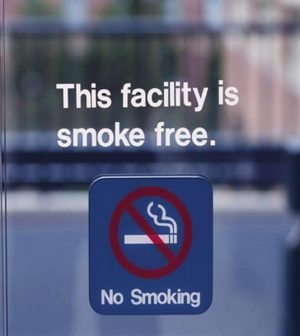- Could Your Grocery Store Meat Be Causing Recurring UTIs?
- Are You Making This Expensive Thermostat Error This Winter?
- Recognizing the Signs of Hypothyroidism
- 10 Strategies to Overcome Insomnia
- Could Artificial Sweeteners Be Aging the Brain Faster?
- Techniques for Soothing Your Nervous System
- Does the Water in Your House Smell Funny? Here’s Why
- Can a Daily Dose of Apple Cider Vinegar Actually Aid Weight Loss?
- 6 Health Beverages That Can Actually Spike Your Blood Sugar
- Treatment Options for Social Anxiety Disorder
Smoking Bans Might Help Nonsmokers’ Blood Pressure

Smoking bans in public places might protect more than the lungs of nonsmokers, with new research suggesting a beneficial effect on blood pressure.
“We found that nonsmoking adults in the study who lived in areas with smoke-free laws in restaurants, bars or workplaces had lower systolic [top number] blood pressure by the end of the follow-up period compared to those who lived in areas without smoke-free laws,” said lead author Stephanie Mayne. She is a research scientist at the Center for Pediatric Clinical Effectiveness at Children’s Hospital of Philadelphia.
The study included more than 2,600 adults in four U.S. cities — Birmingham, Chicago, Minneapolis and Oakland — who were followed between 1995 and 2011.
Mayne conducted the study, which was published online Nov. 21 in the Journal of the American Heart Association, while a postdoctoral fellow at Northwestern University’s School of Medicine in Chicago.
“Smoke-free laws were associated with reduced systolic blood pressure, but surprisingly not with reductions in diastolic [bottom number] blood pressure or high blood pressure,” Mayne said in a journal news release.
“It’s not entirely certain why this was the case, but it’s possible that we are detecting effects on systolic blood pressure that are below the threshold for hypertension [high blood pressure],” Mayne said.
Higher systolic blood pressure increases the risk of heart disease even when it is below the level that is considered hypertension, so the reductions in systolic blood pressure seen in this study suggest that smoking bans could have significant heart-related public health benefits, she explained.
“Also, when we looked at differences in blood pressure over time within individuals, comparing years when they lived in an area with a smoke-free law to years when they didn’t, systolic blood pressure was lower on average when they lived in an area with smoke-free laws,” Mayne said.
More information
The U.S. Centers for Disease Control and Prevention has more on preventing high blood pressure.
Source: HealthDay
Copyright © 2026 HealthDay. All rights reserved.










